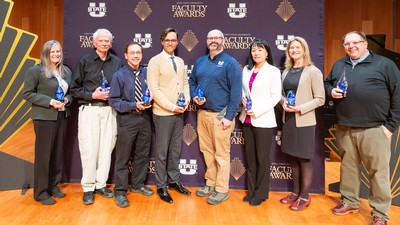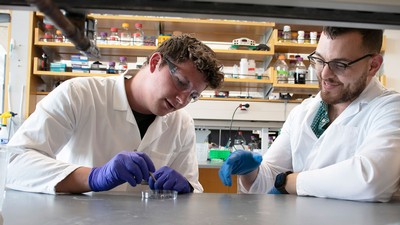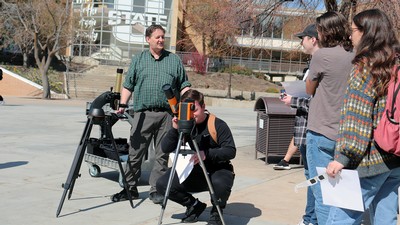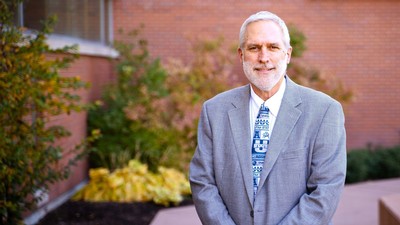And For Homework Today . . . . Explore Machu Picchu
Students in accounting have never before been able to watch their professor go bungee jumping. Never before at the College of Business have students watched their business communications teacher float in the air after deliberately running off of a ledge some 1,700 feet above sea level. Students tackling international economics have never been offered the chance to climb Machu Picchu after class. Last June was the first time students taking a management and human resources class were ever asked to come up with a new breeding schedule for a guinea pig farm.
Never before has any combination of classes at the College of Business included travel to Chile, Brazil and Peru.
Never before has any combination of classes at the College of Business included travel to Chile, Brazil and Peru.
There were a lot of first-ever things happening at the College of Business as a group of 42 students participated in the South American Study Abroad program in May and June 2007.
When one hears of the bungee jumping, hang gliding and motorcycle adventures that were a part of the trip it would be easy to get the wrong impression. When there’s talk of exploring Machu Picchu and walking the famous beaches of Rio de Janeiro the word “vacation” might come to mind.
It's probably not a word one should use around the students who participated on the trip. They might give you a stern talk about the three weeks of intense class work that they had to weather before they left that kept them busy in classes from 8 a.m. to 9:30 p.m.
Or, they might patiently explain to you that when the Logan class work was over and they arrived in Chile, they faced a packed schedule of lectures and meetings with academic, government and business leaders that filled their days when they were in South America.
When class was dismissed, however, the learning had only just begun. Students and faculty took to exploring, meeting people, bargaining for souvenirs and finding their way to local tourist attractions. Those moments of cultural immersion required students to adapt in a world where not very many people spoke English, where funny colorful money had value and where simple things like reading a menu were suddenly challenging.
For five weeks, free time and structured time became periods of intense learning. The mix of classroom time and unstructured time became a crucial part of the learning experience, according to many on the trip. Adam Phelps had heard people talking about the networking opportunities the trip would bring but didn't realize, initially, where most of his most effective networking was taking place.
"The network I’m building is with the people I've got on this trip with me," Phelps said. "I've got six or seven professors I can rely on anytime I need them. I've got 42 other students I've come to rely on, and in the future I wouldn't hesitate to call on them for anything I might need."
Several students said they appreciated the chance they had to get to know professors on the trip.
"We've really come to see our professors as people," USU business student Josh Kerkmann said. "They are not just there in the classroom anymore. They are real people we've got to spend time with, interact with and create friendships with. It's really been a rewarding time to talk with them."
Some legends were born during the experience. Senior Associate Dean Cliff Skousen impressed the students with his fearless sense of adventure. In Rio de Janeiro, he went hang gliding. In Cusco, Peru, when others were going to their hotel rooms to overcome altitude sickness, Skousen went off with some students who rented motorcycles. In their explorations they discovered a bungee-jumping facility that claims to be the highest in the Americas. It wasn't long before surprised students saw Skousen dive from a platform that was nearly 400 feet above the ground.
Writer: Steve Eaton, 435-797-8640
November 2007
Download PDF
Adam Phelps soaking up the scenery atop Machu Picchu
Comments and questions regarding this article may be directed to the contact person listed on this page.






